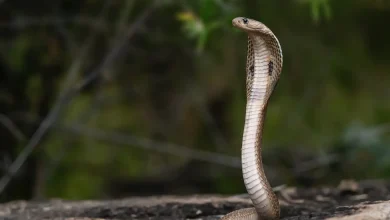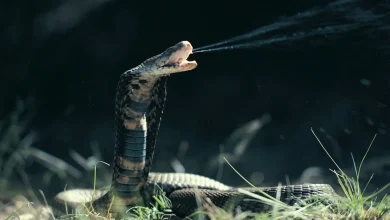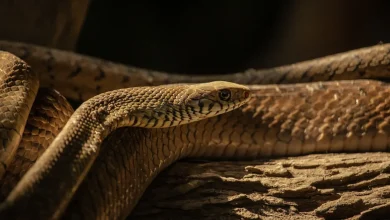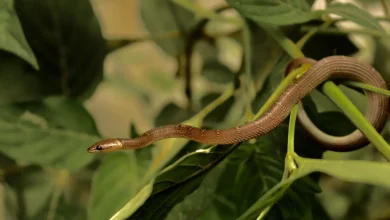The Most Dangerous Snake Bite in Thailand
The Most Dangerous Snake Bite in Thailand: The King Cobra
When it comes to dangerous wildlife in Thailand, the King Cobra tops the list as the most dangerous snake bite to encounter. Known for its potent venom and aggressive nature, the King Cobra’s bite is not only feared but can be fatal within a remarkably short time.
King Cobras (Ophiophagus Hannah) are the longest venomous serpent in the world, can reach lengths of up to 18 feet (5 meters), but most measure between 10 to 12 feet (3 to 3 meters). This iconic snake is native to South and Southeast Asia. It can be found in a variety of habitats, including dense forests, bamboo, grasslands and wetlands. The King Cobra, despite its common name, is not the “true” cobra from the Naja family. It belongs to a separate genus called Ophiophagus, which means “snake eater” and is a good name because its primary food consists of other snakes, including venomous ones like kraits or even large pythons.
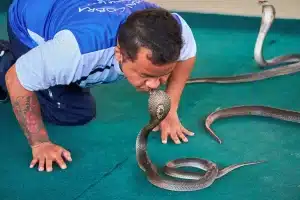
The impressive defensive display of this reptile is not just known for its size, but also for its power. It can raise to a third of its body off the ground vertically, or flare out its iconic hood and emit a low, resonant hiss, which sounds like a growl. Few predators will ignore this warning. The King Cobra is a snake that exhibits unusual parental behaviour. The only snake that builds a nest is the King Cobra. It meticulously gathers and piles up leaves in order to create a protective mound where the female lays eggs. She guards the nest with vigilance until the eggs hatch, a remarkable display of maternal care in reptiles.
Intelligent and alert, King Cobras have strong territorial instincts. They also display complex behaviours that are not seen in any other snake species. They tend to avoid humans whenever possible, despite their fearsome reputation. When cornered or prodded, the apex predator commands respect and caution. It is a powerful blend of precision, instinctual sophistication, and power.
The Deadly King Cobra
The King Cobra, renowned for its daunting size and formidable reputation, holds a particularly ominous record: it has the hardest bite of any venomous snake. This was measured by Luke Yeomans in the UK, a snake expert who tragically fell victim to the very creature he studied.
In Thailand, where a variety of venomous snakes reside, the King Cobra is considered the deadliest. A bite from this fearsome serpent can lead to death in as little as 10 minutes, as was tragically the case with an adult who suffered a bite to the shoulder. The swift fatality is primarily due to the King Cobra’s potent venom and the amount it can inject with a single bite.
The Threat in Numbers
Across Asia, King Cobras are responsible for numerous deaths each year. While exact numbers vary, the lethality of these snakes is well-documented, with their aggressive nature contributing to the danger they pose. Their aggression, combined with a fast-acting venom, makes them a significant threat in the wild.
Survival Time Post-Bite
Survival time after a King Cobra bite can be alarmingly short. In some cases, death has occurred in less than 10 minutes. This rapid decline is often due to anaphylactic shock or, in some cases, a massive coronary as a result of the venom’s effects.
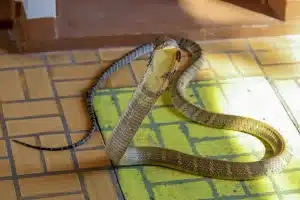
Emergency Response to a King Cobra Bite
In the unfortunate event of a King Cobra bite, especially when hiking or far from medical facilities, immediate action is crucial:
- Stay Calm: Panicking can accelerate the spread of venom in the body.
- Immobilise the Bitten Area: Keep the bitten limb as still as possible to slow venom spread.
- Seek Medical Help Immediately: Call emergency services or head to the nearest hospital as soon as possible.
- Use of Ventolin Inhaler: Some experts suggest carrying a Ventolin inhaler, commonly used for asthma, which can help if you start losing breath due to the bite.
- Epi-Pens for Anaphylactic Shock: In cases of anaphylactic shock, an Epi-Pen can be a lifesaver. If you’re prone to allergies, it’s advisable to carry one during outdoor activities in snake-prone areas.
Conclusion: Respect and Caution
The King Cobra’s reputation as the worst snake to be bitten by in Thailand is well-earned. Its aggressive nature, coupled with a venom capable of killing in minutes, makes it a creature to be respected and avoided. While enjoying the natural beauty of Thailand, it is essential to remain vigilant, especially in areas where these formidable snakes may be present. Remember, in the event of a snakebite, immediate medical attention is vital. The key to survival lies in rapid response and appropriate emergency care.

